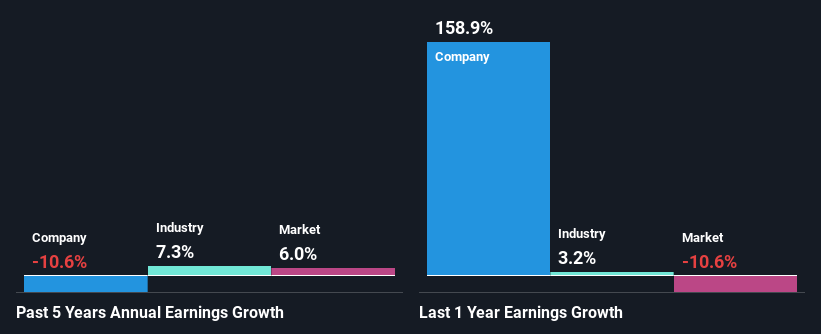- New Zealand
- /
- Electric Utilities
- /
- NZSE:MCY
Is Mercury NZ Limited's (NZSE:MCY) Recent Performance Underpinned By Weak Financials?

With its stock down 12% over the past three months, it is easy to disregard Mercury NZ (NZSE:MCY). Given that stock prices are usually driven by a company’s fundamentals over the long term, which in this case look pretty weak, we decided to study the company's key financial indicators. Specifically, we decided to study Mercury NZ's ROE in this article.
Return on Equity or ROE is a test of how effectively a company is growing its value and managing investors’ money. Put another way, it reveals the company's success at turning shareholder investments into profits.
See our latest analysis for Mercury NZ
How Do You Calculate Return On Equity?
ROE can be calculated by using the formula:
Return on Equity = Net Profit (from continuing operations) ÷ Shareholders' Equity
So, based on the above formula, the ROE for Mercury NZ is:
6.0% = NZ$290m ÷ NZ$4.8b (Based on the trailing twelve months to June 2024).
The 'return' is the income the business earned over the last year. That means that for every NZ$1 worth of shareholders' equity, the company generated NZ$0.06 in profit.
What Has ROE Got To Do With Earnings Growth?
So far, we've learned that ROE is a measure of a company's profitability. Depending on how much of these profits the company reinvests or "retains", and how effectively it does so, we are then able to assess a company’s earnings growth potential. Assuming all else is equal, companies that have both a higher return on equity and higher profit retention are usually the ones that have a higher growth rate when compared to companies that don't have the same features.
Mercury NZ's Earnings Growth And 6.0% ROE
When you first look at it, Mercury NZ's ROE doesn't look that attractive. Next, when compared to the average industry ROE of 9.0%, the company's ROE leaves us feeling even less enthusiastic. Given the circumstances, the significant decline in net income by 11% seen by Mercury NZ over the last five years is not surprising. We reckon that there could also be other factors at play here. For example, it is possible that the business has allocated capital poorly or that the company has a very high payout ratio.
So, as a next step, we compared Mercury NZ's performance against the industry and were disappointed to discover that while the company has been shrinking its earnings, the industry has been growing its earnings at a rate of 7.3% over the last few years.

Earnings growth is a huge factor in stock valuation. What investors need to determine next is if the expected earnings growth, or the lack of it, is already built into the share price. This then helps them determine if the stock is placed for a bright or bleak future. If you're wondering about Mercury NZ's's valuation, check out this gauge of its price-to-earnings ratio, as compared to its industry.
Is Mercury NZ Making Efficient Use Of Its Profits?
With a three-year median payout ratio as high as 112%,Mercury NZ's shrinking earnings don't come as a surprise as the company is paying a dividend which is beyond its means. Paying a dividend higher than reported profits is not a sustainable move.
Additionally, Mercury NZ has paid dividends over a period of at least ten years, which means that the company's management is determined to pay dividends even if it means little to no earnings growth. Upon studying the latest analysts' consensus data, we found that the company is expected to keep paying out approximately 111% of its profits over the next three years. Therefore, the company's future ROE is also not expected to change by much with analysts predicting an ROE of 6.5%.
Summary
Overall, we would be extremely cautious before making any decision on Mercury NZ. Specifically, it has shown quite an unsatisfactory performance as far as earnings growth is concerned, and a poor ROE and an equally poor rate of reinvestment seem to be the reason behind this inadequate performance. With that said, we studied the latest analyst forecasts and found that while the company has shrunk its earnings in the past, analysts expect its earnings to grow in the future. Are these analysts expectations based on the broad expectations for the industry, or on the company's fundamentals? Click here to be taken to our analyst's forecasts page for the company.
New: Manage All Your Stock Portfolios in One Place
We've created the ultimate portfolio companion for stock investors, and it's free.
• Connect an unlimited number of Portfolios and see your total in one currency
• Be alerted to new Warning Signs or Risks via email or mobile
• Track the Fair Value of your stocks
Have feedback on this article? Concerned about the content? Get in touch with us directly. Alternatively, email editorial-team (at) simplywallst.com.
This article by Simply Wall St is general in nature. We provide commentary based on historical data and analyst forecasts only using an unbiased methodology and our articles are not intended to be financial advice. It does not constitute a recommendation to buy or sell any stock, and does not take account of your objectives, or your financial situation. We aim to bring you long-term focused analysis driven by fundamental data. Note that our analysis may not factor in the latest price-sensitive company announcements or qualitative material. Simply Wall St has no position in any stocks mentioned.
About NZSE:MCY
Mercury NZ
Engages in the production, trading, and sale of electricity and related activities in New Zealand.
Good value with proven track record.
Similar Companies
Market Insights
Community Narratives




